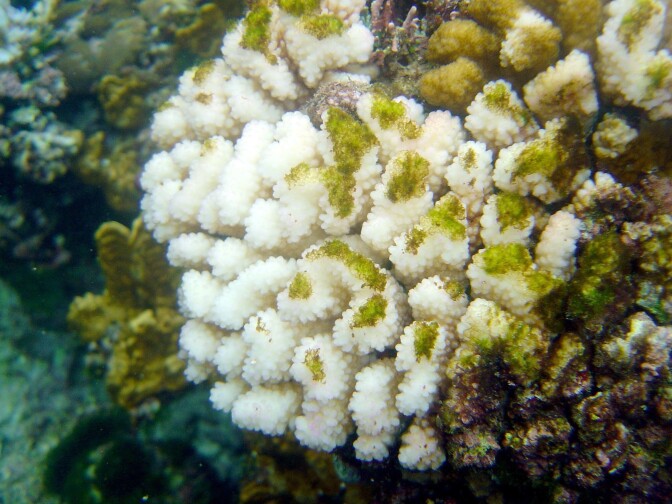This story is free to read because readers choose to support LAist. If you find value in independent local reporting, make a donation to power our newsroom today.
Fearing Their Kids Will Inherit Dead Coral Reefs, Scientists Are Urging Bold Action

Coral reef biologists are often asked the same question again and again: "When my kids grow up, will there still be coral reefs?"
"That's a question I ask myself," says Christopher Cornwall, a research fellow at Victoria University of Wellington in New Zealand. "The greatest fear is that all the coral will be gone at a certain point in time."
New research shows that, in a hotter climate, urgent action will be needed to prevent the vast majority of coral species from collapsing by the end of the century. Humans will have to limit emissions of heat-trapping gases, but that alone likely won't be enough. Reefs may also need a helping hand through efforts like restoration or coral breeding, which cultivates heat-resistant varieties.
Without that, the picture looks increasingly grim. Coral reefs are biodiversity hot spots, supporting around a quarter of all fish species. Millions of people around the world also rely on them for food, jobs and flood protection, since reefs help prevent storm surges from inundating coastlines.
The dramatic impacts come from a climate triple whammy: marine heat waves, ocean acidification and overall warming. The oceans have borne the brunt of climate change thus far, absorbing the vast majority of heat caused by human impacts.
Marine heat waves are expected to become more intense, and high temperatures cause corals to turn ghostly white in what's known as "coral bleaching."
Corals live in a domestic partnership, of sorts, with microscopic algae. The algae provide food for corals, not to mention their vibrant colors. But under periods of intense heat stress, the corals expel the algae, leaving only white skeletons. Some reefs can recover over time, but many die as a result.
These mass bleaching events have been devastating in places like the Great Barrier Reef in Australia, which has experienced three in the last five years.
"It's quite traumatic to see these events in person," Cornwall says. "What happens is only a small fraction of that coral will be able to recover from those events, and a large proportion of those, depending on the heat stress, will die."

Once absorbed by the oceans, carbon dioxide from burning fossil fuels reacts with the water to make it more acidic. The increased acidification can erode reefs and makes it harder for corals to build their skeletons. Overall warmer water temperatures also reduce the reefs' growth rates, even without a marine heat wave.
Corals have to continually grow to counteract erosion from both waves and storms and consumption by other animals such as sponges, sea urchins and parrotfish. But according to a new study, climate change may halt coral growth altogether.
Cornwall and his colleagues looked at three climate futures where human-caused emissions are low, medium or high. Under the medium and high scenarios, the majority of coral reefs are no longer growing by the end of the century. Instead, they'll be eroding away.
Even under the lowest-emissions future, coral growth rates would still be reduced by 76%. Reefs that have experienced less pollution or overfishing will likely do better.
"If we miss this low-emissions-scenario target, the coral reefs are essentially doomed," Cornwall says.
Those dire scenarios have scientists looking for ways to give reefs a helping hand.
"This is just the first major ecosystem that we feel could collapse," says Joanie Kleypas, a scientist at the U.S. National Center for Atmospheric Research, a federally funded research institute. "So we have to do something. The eyes are on us."
Like many other scientists, Kleypas is studying coral species that seem able to handle higher heat or higher acidity. At her field site in Costa Rica, she has seen some hopeful results after major bleaching events.
"The corals survived," she says. "They were completely bleached for months and there was some mortality, but by and large, they survived. So they have some kind of secret."
Scientists are looking at breeding these resilient corals, which could be used to restore reefs. Other protections, such as preventing pollution and overfishing, are also key, Kleypas says.
Still, all these efforts to help corals adapt to hotter temperatures won't be enough if greenhouse gas emissions remain high. In a study published this month, Kleypas and others found that adaptation strategies could buy corals more time if emissions are lowered. But under high emissions, corals still largely disappear.
"If we act fast enough to execute that plan and we bring carbon dioxide emissions way down, then we do — we believe we have a chance that this is the way forward for saving the ecosystem," she says.
Time is short, she says. For coral reefs to survive, emissions would have to fall to zero before 2100, and restoration and adaptation tools would have to be rolled out in a widespread way in the next 20 to 30 years.
Copyright 2021 NPR. To see more, visit https://www.npr.org. 9(MDA1OTI3MjQ5MDEyODUwMTE2MzM1YzNmZA004))








